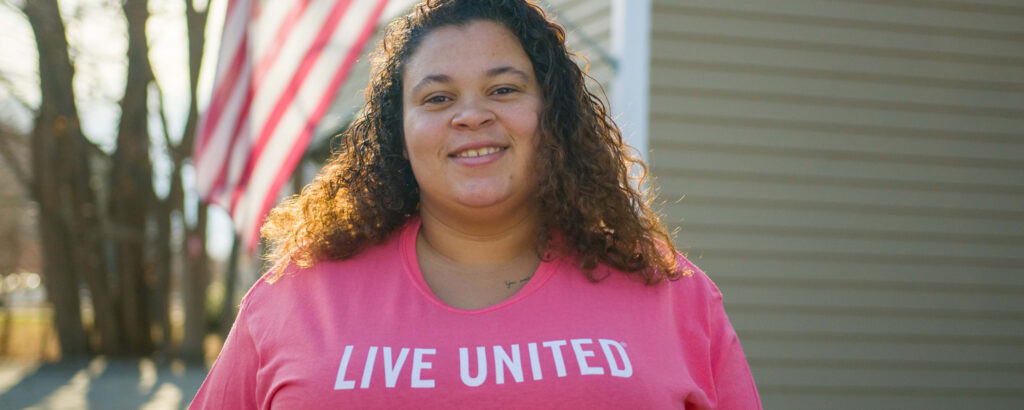From her family to her community, Cassandra prioritizes helping others.
“No matter what I do in life, I’m always going to help people…that’s what I love,” said Cassandra.
In her personal life, Cassandra cares for her three-year-old son Tyson and is always free to lend a hand to friends and family. But her selflessness doesn’t stop there. As a student and professional Cassandra gives back to her community.
It all started when Cassandra was a practicum student, working toward her associate degree.
“I went to my professor and said, ‘I want to work with the community. I want to know what resources are out there.’ My professor told me how United Way works locally to address education, financial stability, and health-related challenges. Both my professor and I felt it would be a great fit.”
And it was. Cassandra did her practicum through the spring semester. She was invited back last fall as a Loaned Executive, where she raises funds for United Way’s campaign and assists with the CA$H program.
CA$H (Creating Assets, Savings & Hope) is a statewide partnership helping to empower Maine individuals and families to achieve long-term financial stability. In addition to year-round financial education and services, CA$H Maine sites help qualifying community members prepare and file their taxes for free, ensuring they receive 100% of their refund.
Cassandra said, “What I love about my job is helping people – helping them get the money they deserve, and they need and helping them find resources in their communities.”
Through the CA$H program, Cassandra helps individuals learn about tax credits and available refunds. One of those credits is the Child Tax Credit (CTC), which is designed to provide a boost to families’ incomes, allowing them to better cover costs associated with raising children like food and childcare. The program provides families with up to $300 per child per month.
Over 230,000 families across Maine receive CTC, helping support their basic needs and giving kids a stronger start in life. Cassandra has seen how powerful this credit has been for the people she works with as well as felt its impact first-hand.
“As a new single parent, I have the expenses of diapers, daycare, food, snacks, toys, and anything [Tyson] needs. It’s tight on a single income. [Getting the CTC] felt like a huge relief. Not only was I able to take a breath and have extra money, but I could also purchase extra food and put some away. It was just a helping hand reaching out. Having it every month has made a huge difference.”
In Maine, CTC is expected to lift 10,000 children out of poverty and substantially lower the number of families who report food insecurity and hunger.
Another credit available to working individuals and families is the Earned Income Tax Credit (EITC). It is one of the most effective anti-poverty, pro-working investments in the community. Through this tax credit, workers with low to moderate incomes can keep more of their hard-earned wages.
In addition to the $3,600 Cassandra receives through her CTC payments, she will receive an estimated $2,500 from EITC when she files her taxes.
Having CTC and planning for the EITC helps Cassandra stabilize and strengthen her immediate and long-term financial stability.
“If I didn’t have [the CTC and EITC], I would not be able to get some of the bills paid and get caught up. It would be very stressful. I don’t even know what I would do,” said Cassandra.
CTC and EITC credits work for families like Cassandra’s, and millions like hers. CTC expansion is expected to lift four million children above the poverty line and narrow the difference in poverty rates for black and white children by 44%.
By reducing poverty and increasing income for working families, the EITC has been linked to positive health outcomes, especially for infants and mothers. Young children in families that receive the EITC do better on tests and go further in school, including graduating from high school — and, when they become adults, tend to get better jobs and earn more.
Cassandra is optimistic about the future and pursuing her dreams. She is currently pursuing a bachelor’s degree in Human Services.
“My goal for myself is to graduate this year, get my car fixed, and possibly a new one. I want to be that minivan mom. I want to get my savings back up to what it used to be before the pandemic. I want to have a safety net and not have to worry for Tyson or for me.”
Cassandra also hopes her son will embrace her giving spirit. “I hope that [Tyson] wants to help people like I do. I hope he wants to follow in my footsteps – always willing to go above and beyond and help.”
You can help advocate for CTC and EITC by visiting cashmaine.org or contacting advocacy@uwsme.org. To find out more about CA$H or find a site near you, visit cashmaine.org or call or text 211.
CA$H encourages all CTC recipients to retain their CTC federal summary, arriving from the IRS in the mail, as they prepare to file this year.
